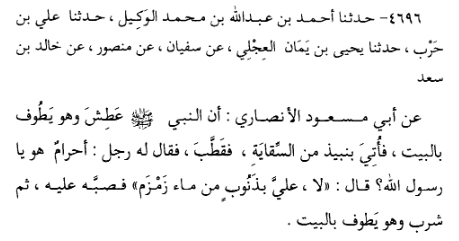This tweet brought to mind a fascinating debate in early fiqh about intoxicants. The word translated as ‘wine’ here -- نبيذ|nabīḏ -- differs from the qurʾanic word for wine (ḫamr|خمر), but its meaning is contested … https://twitter.com/MilkLions/status/1198029480280899585
First a few points, the Qurʾan does not forbid the consumption of wine (ḫamr) and intoxication until the Medinan period. With that being said, one should not be surprised that one finds instances where the Prophet’s Companions did indeed drink intoxicating beverages.
For example, a controversial ḥadīth (though regarded as ṣaḥīḥ by many) claims Q. Nisāʾ 4:43 was revealed after ʿAlī drank wine (ḫamr) with ʿAbd al-Raḥmān ibn ʿAwf at the house of an Anṣārī man and then led the prayers drunk and misread Q. Kāfirūn 109.
Though it often means ‘date-wine’, nabīḏ has a broad semantic range and may include an array of intoxicating and non-intoxicating drinks. Of the 2nd sort many reports exist of the Prophet Muḥammad drinking/preparing non-intoxicating nabīḏ
https://sunnah.com/search/?q=%D9%86%D8%A8%D9%8A%D8%B0
https://sunnah.com/search/?q=%D9%86%D8%A8%D9%8A%D8%B0
The ḥadīth literature records on famous report of the Prophet consuming intoxicating nabīḏ from the siqāyah of Mecca, which prepared the alcoholic drink for pilgrims, transmitted on the authority of Abū Masʿūd al-Anṣārī.
During the prophet’s final pilgrimage, he became thirsty. When brought nabīḏ, someone queried if it was forbidden. He said, "No," diluted it with water from Zamzam, and drank it.
https://books.google.com/books?id=FvRLCwAAQBAJ&lpg=PT474&ots=ld1dKcazzw&dq=%D9%8A%D8%B7%D9%88%D9%81%20%D9%81%D8%A3%D8%AA%D9%8A%20%D8%A8%D9%86%D8%A8%D9%8A%D8%B0%20%D9%85%D9%86%20%D8%A7%D9%84%D8%B3%D9%82%D8%A7%D9%8A%D8%A9&pg=PT474#v=onepage&q&f=false
https://books.google.com/books?id=FvRLCwAAQBAJ&lpg=PT474&ots=ld1dKcazzw&dq=%D9%8A%D8%B7%D9%88%D9%81%20%D9%81%D8%A3%D8%AA%D9%8A%20%D8%A8%D9%86%D8%A8%D9%8A%D8%B0%20%D9%85%D9%86%20%D8%A7%D9%84%D8%B3%D9%82%D8%A7%D9%8A%D8%A9&pg=PT474#v=onepage&q&f=false
Kūfans and Ḥanafīs, such as Abū Ḥanīfah (d. 767) and Muḥammad al-Shaybānī (d. 806), used this tradition and others like it to argue for the permissibility of drinking “strong nabīḏ (النبيذ الشديد)”—also called al-ṣulb min al-nabīḏ--as long as one does not get intoxicated.
But what about ʿUmar ibn al-Khaṭṭāb? Shaybānī includes the following tradition is his Kitāb al-Āṯār that suggests that the nabīḏ that ʿUmar consumed was indeed of the strong sort: https://archive.org/details/athar_alshibany/page/n716
The tradition says ʿUmar found a drunk Bedouin, whom he imprisoned and whipped once the man regained his sobriety. But then ʿUmar “called for what remained in the man’s waterskin to brought over. He tasted it and, lo, prohibited strong nabīḏ...
He called for water and diluted it. ʿUmar used to love strong drink; he drank and poured some for his table companions. Then he said, ‘Dilute it with water, lest its devil get the best of you.’” /fin
further reading:
https://www.jstor.org/stable/43304475
https://www.jstor.org/stable/43304475

 Read on Twitter
Read on Twitter




